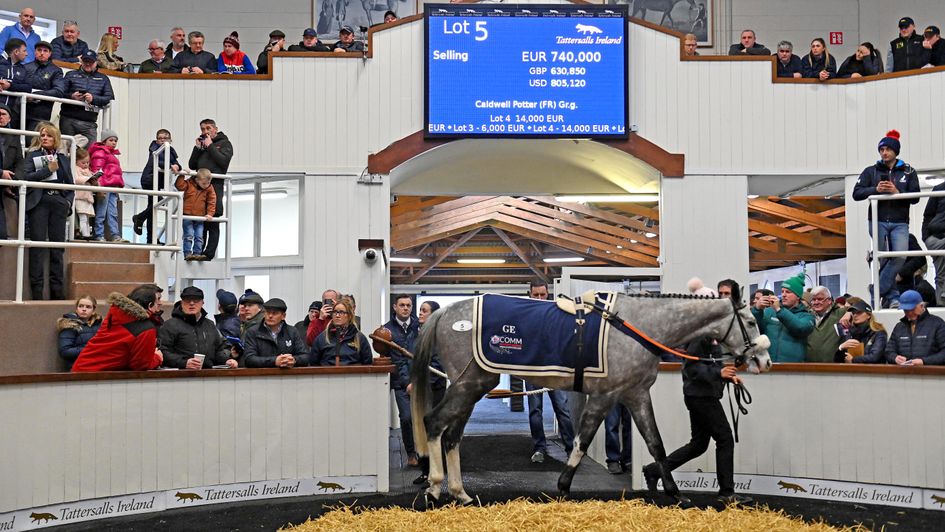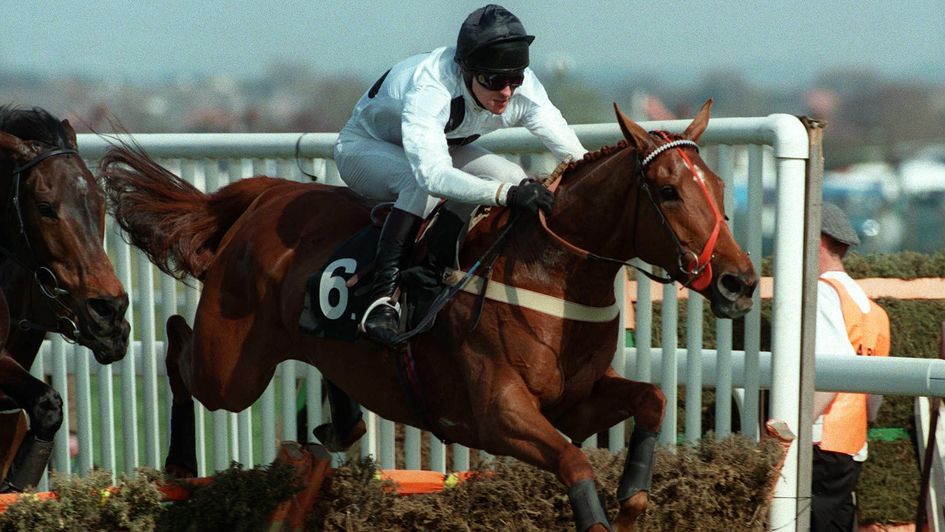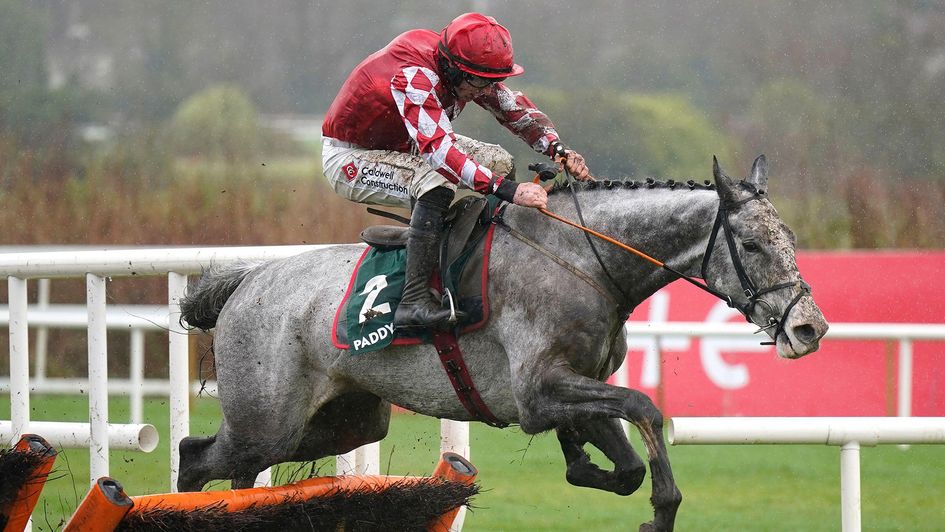Following the record-breaking sale of novice hurdler Caldwell Potter in Ireland last week, John Ingles looks at other jumpers who have set records in the sale ring.
A million dreams for the world we're gonna make
How long before jump racing has its own version of Trevor Francis?
By modern Premier League standards, a million pounds is loose change in the transfer market, but back in 1979 it was an astronomical amount for a footballer, almost twice the previous record for a player transfer. But that was the sum which took Francis, who died in Spain at the age of 69 last summer, from Birmingham City to Brian Clough’s Nottingham Forest. Just months later, Francis headed the goal which won Forest their first European Cup, but his stay at the club proved short-lived as he moved on to Manchester City in 1981 – for £1.2 million.
There was speculation last week that jumping might have its first seven-figure ‘transfer’ when the Gordon Elliott-trained Grade 1 winner Caldwell Potter went through the ring at Tattersalls Ireland. The six-year-old grey son of Martaline won the Future Champions Novice Hurdle at Leopardstown on his last start in December, earning a Timeform rating of 147p and stamping himself as a leading contender for one of the novice hurdles at the Cheltenham Festival.
But following the surprise decision by his owners Andy and Gemma Brown to take a break from ownership and disperse their string, he was the most high-profile lot in a sale of 29 of the couple’s horses who race under the Caldwell Construction Ltd name.

While Caldwell Potter didn’t make a million euros in the end, he took the record for a jumper sold at public auction another step nearer that figure when selling for €740,000. Elliott was naturally keen to keep Caldwell Potter in his yard but the successful bid was made by Anthony Bromley on behalf of well-known owners John Hales, Ged Mason, Sir Alex Ferguson and Peter Done which means Caldwell Potter will be continuing his career with Paul Nicholls. One of his new owners, of course, knows a thing or two about big-money transfers himself.
Elliott does at least still have Caldwell Potter’s exciting younger half-sister Brighterdaysahead (a €310,000 purchase by Gigginstown as an unraced three-year-old) who puts her unbeaten record on the line at Navan on Sunday. Elliott also trained Caldwell Potter’s ill-fated brother Mighty Potter, he too a winner of the Future Champions at Leopardstown in the Caldwell Construction colours and twice a Grade 1 winner as a novice chaser for them last season. This is a very talented family as Caldwell Potter’s half-brothers French Dynamite and Indiana Jones are both smart chasers with Mouse Morris in the Robcour colours.
'Bloody expensive flop'
Type in the name ‘Gatflax’ in a search engine and you’ll probably be met with the question ‘did you mean Netflix?’. No – Gatflax - who long before the days of streaming created his own piece of sales-ring history when selling for the then record price for a jumper of 200,000 guineas at Doncaster in the autumn of 1998. He’d finished third in the Supreme Novices’ Hurdle earlier that year when trained by Nigel Twiston-Davies, Timeform’s report on him at Cheltenham describing him as ‘a smashing sort…he’ll make a lovely novice chaser next season.’
Dr John Hollowood clearly thought so, spending what was considered at the time an astonishing amount for a jumper before putting Gatflax into training with Andy Turnell. However, ‘bloody expensive flop’ wasn’t the headline that connections were hoping for after Gatflax’s eagerly awaited chasing debut at Wetherby where he finished a tailed-off last, reportedly having bled.
It was to be nearly three years before Gatflax finally won a race for his new connections, and while he won twice more after that, he clearly had his problems and never showed more than modest form as a chaser.

Grey is the colour?
Jumpers like Caldwell Potter who come up for sale having already shown plenty of ability but still very much on an upward curve don’t often appear on the market. But it’s a condition of the Million In Mind Partnership that their horses are sold after a season of racing which has led to a number of very promising horses in their colours changing hands for record sums over the years. The first of those was the 1994 Triumph Hurdle winner Mysilv, sold out of David Nicholson’s stable for 155,000 guineas before winning another five races for the Elite Racing Club, including the Tote Gold Trophy, and finishing second in the Stayers’ Hurdle and Grande Course de Haies d’Auteuil.
The gelding who broke Gatflax’s record price was interesting because Mister Banjo, like Caldwell Potter, was sent to Paul Nicholls after being bought by John Hales. He had to go to 240,000 guineas in 2000 to buy the Finale Junior Hurdle winner whose only defeat in four starts for Nicky Henderson had come in the Triumph Hurdle.
Mister Banjo did well over hurdles for his new connections, winning the Relkeel Hurdle and finishing second to Lady Rebecca in the Cleeve Hurdle, and while he did go on to win over fences as well, leg problems restricted his chasing career. Mister Banjo, incidentally, was a bay, but given that Hales has owned the likes of One Man, Neptune Collonges and Politologue, it begs the question would he have been quite so keen on acquiring Caldwell Potter had he too not been a grey?
Right Royal record
The next record breaker sold by Million In Mind, in 2003, was another trained by Henderson, though Royal Rosa was a bumper horse and a winner for the third time in that sphere in the Grade 1 contest at the Punchestown Festival. That helped him sell for 340,000 guineas to Andrea and Graham Wylie who were spending large sums assembling their string of jumpers with Howard Johnson at the time.
Royal Rosa was a smart novice hurdler the following season, finishing runner-up to the Stayers’ Hurdle winner Iris’s Gift in the Liverpool Hurdle. He didn’t make the same impact in staying chases but was twice placed in the Becher Chase over the big fences at Aintree without having the same success in a couple of Grand National attempts.
Just a year after Royal Rosa, another Million In Mind horse smashed the previous record when selling for 530,000 guineas. A son of Garde Royale like Royal Rosa, Garde Champetre ended his novice season for Paul Nicholls with a Grade 1 win in the Mersey Novices’ Hurdle where Monet’s Garden and Inglis Drever finished in the frame behind him.
Nicholls was naturally keen to keep hold of him and Johnson was another underbidder but it was in J. P. McManus’s colours that Garde Champetre saw out the rest of his career, initially trained by Jonjo O’Neill. McManus was likely hoping he’d bought a Gold Cup or Grand National prospect at that price but Garde Champetre found his niche in cross-country chases with Enda Bolger, winning the La Touche Cup at Punchestown but also doing well at Cheltenham where he won six times, including twice at the Festival.
Jonbon balancing his books
It will soon be twenty years since Garde Champetre broke the half-million barrier in guineas and these days the sort of sums which had once been spent on Grade 1 winners are now splashed out on unproven young horses who have won their only starts in Irish points.
McManus, for example, went to £570,000, then a record for a pointer at auction, for just such an animal in November 2020. He’d won his point by 15 lengths but also owed his price tag to being a full brother to the outstanding chaser Douvan. Against all odds perhaps, Jonbon has actually now recouped that massive outlay in winning twelve of his fifteen starts for Nicky Henderson and finishing second in the other three, earning more than £600,000 in total prize money in the process.

Lure of Festival still fuels fantasy sums
Jonbon might have been the most expensive pointer to go through the ring, a claim to fame he soon had to share with Cheveley Park Stud’s purchase Classic Getaway, now a very smart chaser with Willie Mullins, but it was Interconnected whose auction record was broken by Caldwell Potter. Like him, Interconnected was another who came on the market as a result of some high-profile owners, in his case Mike Grech and Stuart Parkin, dispersing their string. He cost the not inconsiderable sum of £220,000 as a winning pointer himself but fetched nearly three times that amount, £620,000, when selling at Doncaster in May 2019 having finished second in a novice hurdle at Newbury for Nicky Henderson on his Rules debut.
McManus was apparently an underbidder for Interconnected but it was Darren Yates – ‘he’s got Gold Cup written all over him’ – who made the winning bid. But Interconnected was to prove more of a Gatflax than a Jonbon. He never made the track for the first trainer Yates sent him to, Phil Kirby, and he remained a maiden under Rules, after defeats at odds of 11/10, 7/4, 1/4 and 13/8, following a switch to Dan Skelton.
But expecting these hugely expensive National Hunt purchases, who have zero stud value, to pay for themselves or turn a profit as though they’re some form of investment is perhaps missing the point of ‘buying the dream’ of a potential Festival winner. It’s nonetheless easy to sympathise with the view that the huge sums paid for jumpers can seem like madness for those of us whose income is less disposable.
But the likes of McManus and the gentlemen involved in the purchase of Caldwell Potter, one of them a billionaire, do not exactly have to worry too much about getting their outlay back in prize money. In fact, given the choice between Jonbon ‘washing his face’ or winning on jumping’s biggest stage – something he has yet to do, with two of those seconds coming in the Supreme and Arkle – you suspect that McManus would choose the latter.
More from Sporting Life
Safer gambling
We are committed in our support of safer gambling. Recommended bets are advised to over-18s and we strongly encourage readers to wager only what they can afford to lose.
If you are concerned about your gambling, please call the National Gambling Helpline / GamCare on 0808 8020 133.
Further support and information can be found at begambleaware.org and gamblingtherapy.org










